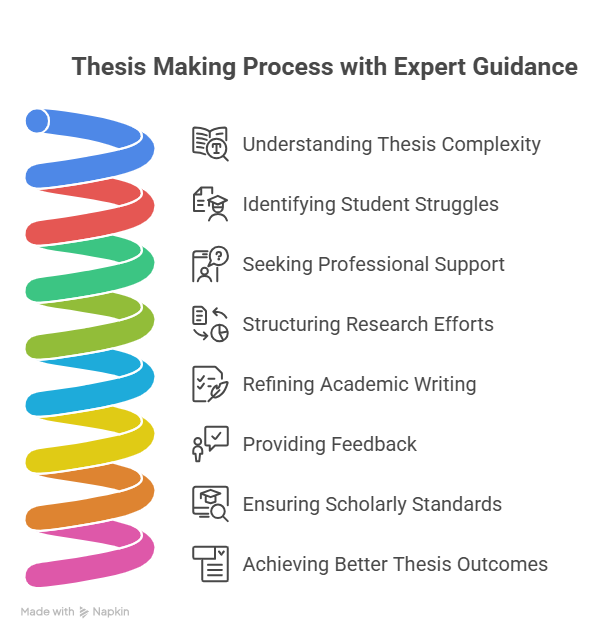Thesis making is more than just a requirement for graduation—it reflects the depth of your academic learning and intellectual maturity. Whether you are enrolled in a master’s program or advancing through a doctoral degree, the process is designed to measure your ability to engage in independent research, analyze complex problems, and present findings in a scholarly format. It is a critical step in demonstrating not only what you’ve learned, but how effectively you can apply that knowledge in a research context.
For many students, thesis making represents the transition from being a learner to becoming a contributor in their academic field. A well-crafted thesis shows command over the subject, a solid grasp of research methodology, and the capacity to build arguments backed by evidence. It can also open doors to publishing opportunities, academic recognition, or further research roles. As such, it requires careful planning, a disciplined approach, and a commitment to academic integrity.
Despite its importance, thesis making can often feel overwhelming. Challenges such as choosing a suitable topic, conducting a literature review, applying the correct methodology, and presenting data effectively are common pain points. Many students also struggle with maintaining originality and adhering to institutional guidelines. This is where timely support and understanding of the process become crucial to turning a complex project into a successful academic achievement.
Table of Contents
Thesis Making as a Scholarly Contribution
Your thesis is more than just a graduation requirement—it is a formal contribution to academic knowledge. Through thesis making, you demonstrate your ability to identify research gaps, synthesize information, and propose original solutions or insights. This academic exercise showcases your independent thinking and analytical capabilities, which are highly valued in both academia and industry.
In addition to fulfilling institutional requirements, thesis making also lays the groundwork for future scholarly engagement. A well-crafted thesis often serves as the basis for conference presentations, journal publications, or even further doctoral research. It not only adds to the body of knowledge in your field but also helps establish your credibility as a researcher. By contributing new perspectives or validating existing theories, your thesis positions you as an active participant in academic discourse and enhances your prospects for academic and professional advancement.
Bridging Theory and Real-World Application
A well-developed thesis serves as a crucial link between theoretical knowledge and real-world relevance. Thesis making equips students with the research tools needed to solve practical problems, apply academic models, and evaluate real scenarios. In many disciplines, a thesis may even become the foundation for applied research, patents, or innovative solutions in the professional domain.
Unlocking Future Research and Career Opportunities
Engaging seriously in thesis making can open doors to professional growth. A high-quality thesis often leads to conference presentations, journal publications, scholarships, and collaborative research opportunities. It enhances your academic profile and can significantly influence admission into PhD programs or roles in research and development sectors.
The Strategic Nature of Thesis Making
Thesis making is not just about writing—it requires strategic planning, disciplined execution, and technical expertise. From defining a precise research question to selecting the right methodology, every step requires clarity and focus. Without a structured approach, even strong ideas can fail to take shape. That’s why successful thesis making demands more than effort—it calls for informed academic strategy.
Step-by-Step Process of Effective Thesis Making
- Topic Selection: Choosing a Research Problem That Matters
The foundation of a strong thesis lies in choosing a relevant, original, and manageable research topic. Your topic should align with your academic background, address a real problem or research gap, and be feasible within your timeline and resources. An unclear or overly broad topic can complicate the entire process. Hence, investing time in refining your research idea is essential.
- Literature Review: Building the Intellectual Framework
Once your topic is finalized, conduct a comprehensive literature review to understand what has already been explored in your field. This chapter forms the backbone of your research, offering context and identifying gaps your study aims to fill. It also supports the development of your theoretical framework and justifies your research direction. Ensure your sources are current, peer-reviewed, and relevant to your research scope.
- Defining Research Objectives and Questions
Clear and focused research questions drive the entire thesis-making process. These should stem from your literature review and be framed to produce meaningful, measurable results. Accompanied by well-articulated objectives and hypotheses, your research question sets the direction for your methodology and analysis.
- Methodology Design: Structuring Your Research Approach
Your methodology explains how you plan to conduct your research and should align closely with your objectives. Choose between qualitative, quantitative, or mixed methods based on your research design. Clearly describe your data collection tools, sampling techniques, ethical considerations, and statistical or analytical tools. A well-documented methodology ensures transparency and enhances the credibility of your work.
- Data Collection and Analysis: Converting Raw Inputs into Insight
After designing your methodology, collect and analyze your data systematically. Data analysis involves applying statistical, mathematical, or thematic tools to interpret your findings. This phase is critical—it transforms your raw inputs into valuable insights that support your research claims. Ensure accuracy and avoid bias in your interpretation. Where applicable, use graphs, tables, and visuals to present your findings clearly.
- Writing the Thesis: Structuring Your Ideas with Academic Precision
Writing your thesis involves more than just organizing words—it’s about structuring ideas in a logical, formal, and academic tone. A typical thesis includes:
- Title Page
- Abstract
- Introduction
- Literature Review
- Methodology
- Results
- Discussion
- Conclusion and Recommendations
- References
- Appendices
Each section should build upon the last, maintaining coherence and consistency throughout. Use clear transitions and ensure your argument is supported by evidence at every stage.
- Editing, Proofreading, and Formatting: Perfecting the Final Draft
The final stages of thesis making involve rigorous proofreading, editing, and formatting. This step ensures your thesis meets university guidelines, eliminates grammatical errors, and improves readability. Use referencing styles such as APA, MLA, Chicago, or IEEE as required. Checking for plagiarism using tools like Turnitin or iThenticate is also essential to uphold academic integrity.
Navigating the Roadblocks: Key Challenges in Thesis Making
Difficulty in Narrowing Down a Research Topic
One of the earliest and most critical challenges in thesis making is selecting a focused and research-worthy topic. Many students struggle to define a clear research problem that is both original and manageable. An overly broad topic can lead to confusion, while an overly narrow one may lack sufficient academic relevance. Choosing the right topic is the foundation of successful thesis making, and often requires early guidance from mentors or experts.
Gaps in Understanding Methodological Approaches
Thesis making demands a sound understanding of research methodology—quantitative, qualitative, or mixed methods. However, many students face confusion in choosing the right design, data collection tools, or sampling techniques. A poorly designed methodology can compromise the reliability of findings. Comprehensive knowledge of methodological standards is essential to build a strong and credible thesis.
Difficulty in Articulating Complex Academic Ideas
Even when students have good research material, expressing ideas clearly and academically is often a challenge. Thesis making requires formal academic language, logical flow, and evidence-backed arguments. Struggles with writing style, structure, and tone can make the thesis appear weak, despite sound research. This is especially common among non-native English speakers or first-time thesis writers.
Challenges in Interpreting Statistical Data
Many thesis topics involve data analysis, which requires familiarity with tools like SPSS, R, Excel, or MATLAB. A major challenge in thesis making arises when students lack the statistical knowledge needed to draw meaningful conclusions from their data. Misinterpretation or improper analysis can lead to inaccurate findings, weakening the entire research output.
Maintaining Originality and Formatting Standards
Academic institutions place strict emphasis on originality and formatting. However, maintaining a low plagiarism score and adhering to citation styles such as APA, MLA, or IEEE is difficult without experience. In thesis making, even minor formatting errors or improperly cited sources can result in rejections or ethical concerns. Awareness and use of plagiarism detection tools are critical to overcoming this hurdle.
Expert Guidance: A Key to Success in Thesis Making
Understanding the Complexity of Thesis Making
Thesis making is not just about writing—it’s an intensive academic journey that involves choosing a relevant topic, conducting in-depth research, analyzing data, and presenting it all in a structured format. Every stage demands precision, critical thinking, and strict adherence to academic standards. For many students, especially those juggling other responsibilities, this complex process can be overwhelming without the right direction.
Why Students Struggle with Thesis Making
Many students face difficulties during thesis making due to a lack of prior research experience or limited exposure to academic writing. Common challenges include narrowing down the research scope, writing a cohesive literature review, maintaining originality, and applying proper citation styles. Additionally, time constraints and unclear guidelines from institutions further complicate the process, making expert help a practical necessity.
How Professional Guidance Adds Value to Thesis Making
Seeking professional support in thesis making brings much-needed structure and clarity. Experts assist in organizing research efforts, refining academic writing, and providing feedback at critical stages. Whether it’s finalizing the methodology, analyzing results using SPSS or MATLAB, or formatting according to APA or IEEE standards, expert services ensure that every component meets scholarly expectations and increases the chances of approval.
Choosing Expert Help for Better Thesis Outcomes
When it comes to thesis making, the right support can turn a stressful obligation into a manageable and even rewarding process. Professional services not only help improve the overall quality of the thesis but also save time and reduce the risk of errors. Trusted providers like PhDiZone guide students through every step—from ideation to final submission—ensuring that the final thesis is academically sound, well-organized, and publication-ready.
PhDiZone Role in Simplifying Thesis Making
PhDiZone is a trusted academic partner that specializes in offering end-to-end support for thesis making. Whether it’s the early phase of topic selection or the final step of formatting for submission, their team helps scholars stay aligned with academic standards while maintaining their unique research voice. By streamlining each phase of thesis making, PhDiZone reduces stress and enhances productivity, allowing students to focus on content rather than formatting or compliance issues.
Thesis Making Services Offered by PhDiZone
PhDiZone delivers end-to-end academic support designed to simplify and strengthen the thesis making journey. Each service is crafted to meet institutional standards while preserving the student’s original research perspective. Here’s a closer look at the core services offered:
Topic Finalization and Proposal Development
The foundation of thesis making lies in selecting a strong, researchable topic. PhDiZone assists students in identifying topics that are relevant, impactful, and academically viable. They also offer structured guidance in drafting a compelling research proposal that aligns with the study objectives and academic requirements.
Comprehensive Literature Review and Gap Identification
A well-developed literature review is central to establishing research context. PhDiZone helps scholars perform exhaustive literature reviews, synthesize existing findings, and identify critical research gaps. This ensures a strong theoretical framework for the thesis.
Methodology Design and Tool Selection
PhDiZone supports students in developing precise, discipline-specific methodologies. From choosing between qualitative, quantitative, or mixed methods to selecting appropriate tools, their experts provide clarity at every stage. This makes the thesis making process more structured and academically sound.
Advanced Statistical Data Analysis
Thesis making often involves interpreting complex data. PhDiZone provides expert statistical support using tools like SPSS, R, MATLAB, and Excel. Whether it’s hypothesis testing, regression, or visualization, their data experts ensure accurate, insightful results.
Plagiarism-Free Content through Manual Rewriting
Maintaining originality is essential in thesis making. PhDiZone ensures plagiarism-free work through detailed manual rewriting and uses premium tools like Turnitin to validate originality. This service upholds academic integrity and helps avoid ethical pitfalls.
Formatting, Referencing, and Submission-Ready Preparation
To meet university or journal standards, PhDiZone meticulously formats documents based on style guides like APA, MLA, IEEE, or Chicago. They ensure that references, citations, headings, tables, and annexures are consistently formatted, delivering a polished, submission-ready thesis.
Achieving Academic Success Through Structured Thesis Making
With professional input, thesis making becomes less daunting and more results-oriented. PhDiZone structured workflow and academic mentorship ensure that each thesis meets institutional expectations and international quality standards. Students not only produce a well-researched and original document but also gain a deeper understanding of research methodology, data interpretation, and scholarly communication. This enhances not just their academic record but also their long-term research skills and confidence.
Frequently Asked Questions
- Can I get support for just one chapter or section of my thesis?
Yes. PhDiZone offers flexible, chapter-wise assistance for students who need help with specific parts of their thesis making process. Whether you require support for your literature review, methodology, data analysis, or final formatting, our experts are ready to assist with precision and academic compliance. - Is it ethical to seek professional thesis writing help from PhDiZone?
Absolutely. PhDiZone provides ethical academic support that includes editing, proofreading, guidance, and formatting—not ghostwriting. Our goal is to enhance the quality of your thesis making while preserving your original research voice and academic integrity. - How long does it take to complete a thesis with PhDiZone’s support?
The duration varies depending on your topic complexity, academic level, and research scope. On average, thesis making with PhDiZone support can take anywhere from 3 to 12 months, with timelines tailored to your specific goals and institutional deadlines. - Which software tools does PhDiZone use for thesis making support?
PhDiZone employs advanced analytical and research tools based on your study’s methodology. Commonly used software includes SPSS, MATLAB, R, NVivo, and Excel, enabling accurate data interpretation and professional-quality analysis. - Can PhDiZone assist with journal publication after thesis submission?
Yes. In addition to thesis making, PhDiZone offers comprehensive journal publication services. This includes manuscript formatting, selecting appropriate journals (Scopus, UGC CARE, SCI), drafting response letters to reviewers, and managing the submission process—helping you publish with confidence.
Conclusion
Thesis making is more than a final academic requirement—it’s a structured journey that reflects your dedication, subject mastery, and ability to conduct meaningful research. From selecting a relevant topic to crafting a well-supported conclusion, each step in the thesis making process sharpens your intellectual skills and prepares you for future scholarly or professional pursuits. While the path may seem challenging, it also presents one of the most rewarding opportunities in your academic career.
However, the complexity involved in thesis making often requires more than self-effort. Many students face difficulties with data interpretation, academic formatting, or aligning with university guidelines. This is where structured support can make a transformative difference. With its deep expertise and commitment to quality, PhDiZone offers comprehensive thesis assistance—ensuring every section of your thesis is accurate, original, and academically sound.
Whether you’re just beginning to outline your research or finalizing your draft for submission, partnering with an experienced service like PhDiZone can help you navigate thesis making with clarity and confidence. With customized support, plagiarism checks, methodological guidance, and final formatting, PhDiZone empowers you to deliver a thesis that meets academic standards and exceeds expectations. Investing in professional guidance today will shape the success of your academic journey tomorrow.











